The Planetarium runs a range of educational courses throughout the year, taught by our experienced astronomers. Learn about everything from constellations and telescopes to the skies of Aboriginal Australians and Ancient Egyptians. Courses are run as either one-off sessions, or as part of a series that spans a few weeks.
Upcoming courses
View our upcoming courses
-
The Night Sky
Join astronomer Paul Curnow for a 10-week introductory astronomy course at the Adelaide Planetarium.
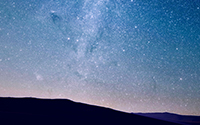 Ever wondered how astronomers find their way around the night sky? Come and learn how to find the different constellations (patterns) in the sky and learn about the mythology related to them. Learn about the nine planets (including Pluto) in our solar system and some of the moons orbiting them. Discover the history behind astronomy and how early astronomers worked out the distances to stars, the magnitude of stars and more about the deep sky wonders of our galaxy.
Ever wondered how astronomers find their way around the night sky? Come and learn how to find the different constellations (patterns) in the sky and learn about the mythology related to them. Learn about the nine planets (including Pluto) in our solar system and some of the moons orbiting them. Discover the history behind astronomy and how early astronomers worked out the distances to stars, the magnitude of stars and more about the deep sky wonders of our galaxy.Learn about purchasing your first telescope and the best places to view the night sky. This is one of the few courses in the world that has access to a planetarium as a teaching tool.
*This course is aimed at the adult beginner - children under 16 not permitted.
Date Time Cost Status 12th January - 16th March 2026 7pm to 9.30pm $280 per person
BOOK NOW -
Stars and Planets
In this course, you will be taken on a grand tour covering a range of topics that are the core of astronomy – Stars, Planets, Galaxies and the Cosmos. You will learn the methods and instruments both professional and amateur astronomers use to probe the night sky. In a series of 8 sessions, you will learn how to identify constellations and planets in the night sky, tour the planets close up and see why they are so different from one another. Then off to interstellar space to learn of the variety of stars and how they are formed, then beyond to the wider cosmos of galaxies, black holes and other exotic phenomena. You will also how learn your telescope works and even how to make a simple educational spectroscope, the indispensable instrument astronomers use to decipher the physical nature and dimensions of the universe.
 Each week will cover a different topic:
Each week will cover a different topic:- Week 1: Introduction to Astronomy
- Week 2: Discover the Planets
- Week 3: Tour of the Solar System
- Week 4: Mapping the Sky
- Week 5: Discover the Stars
- Week 6: Backyard Astronomy
- Week 7: The Great Telescopes
- Week 8: The Universe and Beyond
Date Time Cost Astronomy Educator Status 1st May - 19th June 2025 7.30pm to 9.30pm $280 per person Martin Lewicki BOOK NOW -
Aboriginal Skies
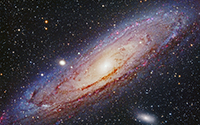 Aboriginal Australians have been looking at the night sky for thousands of years. During this time they have been able to build up a complex knowledge of the stars and their movements. Come and learn how to find the different constellations (stellar patterns) as seen by indigenous groups throughout Australia. Hear about the Dreaming stories that relate to the night sky, and learn about how constellations like the Southern Cross and Orion are seen by Aboriginal Australians. The evening is strictly designed for the adult beginner, with little or no astronomical knowledge who would like to know more about the night sky and the constellations, as seen by the Aboriginal Peoples of Australia.
Aboriginal Australians have been looking at the night sky for thousands of years. During this time they have been able to build up a complex knowledge of the stars and their movements. Come and learn how to find the different constellations (stellar patterns) as seen by indigenous groups throughout Australia. Hear about the Dreaming stories that relate to the night sky, and learn about how constellations like the Southern Cross and Orion are seen by Aboriginal Australians. The evening is strictly designed for the adult beginner, with little or no astronomical knowledge who would like to know more about the night sky and the constellations, as seen by the Aboriginal Peoples of Australia.Date Time Cost Astronomy Educator Status Saturday 17th May 2025 7.30pm to 9.30pm $35 per person Paul Curnow BOOK NOW -
Cosmos of Ancient Egypt
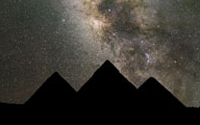 The two earliest civilisations to provide us with writing and recording were those in Mesopotamia and Egypt. It is through these writings that we have been able to gain insights, into the early minds of humankind, and how they believed the world and wider cosmos came into being. What was the Ancient Egyptian view of the cosmos and how the world came into existence? What do we know about Egyptian constellations? In this talk I will introduce you to some of the cosmogony of Ancient Egypt. In addition, I will look at the significance of the night sky and what we know about it from an Ancient Egyptian perspective.
The two earliest civilisations to provide us with writing and recording were those in Mesopotamia and Egypt. It is through these writings that we have been able to gain insights, into the early minds of humankind, and how they believed the world and wider cosmos came into being. What was the Ancient Egyptian view of the cosmos and how the world came into existence? What do we know about Egyptian constellations? In this talk I will introduce you to some of the cosmogony of Ancient Egypt. In addition, I will look at the significance of the night sky and what we know about it from an Ancient Egyptian perspective.* This course is aimed at the adult beginner - children under 16 not permitted.
Date Time Cost Astronomy Educator Status 19th July 2025 7pm to 8pm $26 per person Paul Curnow BOOK NOW -
Beneath Australian Skies
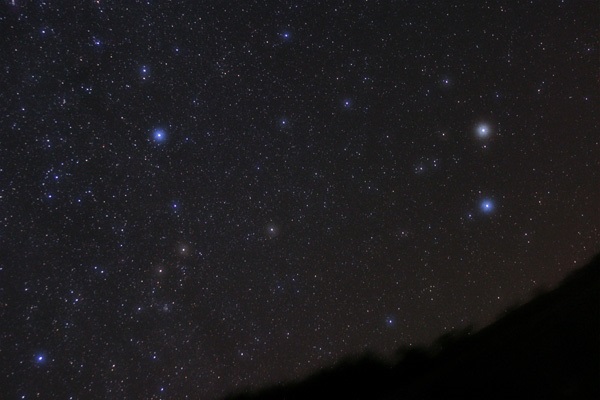 Ever wondered what you're looking at when you look up at the night sky? Have you ever wanted someone to take you on a general tour of what we can see beneath Australian skies? Do all cultures see the same, or are there differences? Australia has some of the darkest skies in the world - that are well suited for those who like to ponder as they gaze skyward. The celestial ballet of stars above is rich in story, myth and science. Come on a general tour of the night sky with popular astronomer Paul Curnow - who has been taking audiences on cosmic journeys at the Adelaide Planetarium for nearly 30 years! This session will also feature the full dome movie entitled 'Capturing the Cosmos'.
Ever wondered what you're looking at when you look up at the night sky? Have you ever wanted someone to take you on a general tour of what we can see beneath Australian skies? Do all cultures see the same, or are there differences? Australia has some of the darkest skies in the world - that are well suited for those who like to ponder as they gaze skyward. The celestial ballet of stars above is rich in story, myth and science. Come on a general tour of the night sky with popular astronomer Paul Curnow - who has been taking audiences on cosmic journeys at the Adelaide Planetarium for nearly 30 years! This session will also feature the full dome movie entitled 'Capturing the Cosmos'.
* This event is aimed for audiences 16 and above.Date Time Cost Astronomy Educator Status Future dates TBA 7.30pm to 8.30pm $26 per person Paul Curnow -
Aboriginal Cosmos
Have you ever wondered about the Australian Aboriginal view of how the cosmos came into existence? How did humans and other animals first come into existence? What are some of the origins of Aboriginal place names and geological features? Aboriginal Australians have been looking at the night sky for some 50,000 years. During this time they have been able to build up a complex knowledge of the stars and their movements. How do their observations and cosmotheism compare to the modern scientific worldview? What are the differences and similarities between the contemporary western view of the constellations and the Aboriginal view of the sky above? In this course, hear about the Dreaming and the many stories that relate to the Earth, humans, and Aboriginal view of the heavens above.
We will explore the modern 88-constellations and be able to compare them to the night sky as seen by the first Australians. Come and study with renowned astronomer Paul Curnow and learn about some of the most ancient cultures on Earth.
This 4-week course is adults only; and strictly designed for the adult beginner (due to respecting cultural protocols attendees must be aged 16-years or over). Moreover, it is suitable for adults with limited or no astronomical knowledge who would like to know more about the cultures, night sky and the constellations, as seen by the Aboriginal Peoples of Australia.
This is the only course of its type held in a planetarium anywhere in the world!
Future dates TBA 7.30pm to 9.30pm $150 per person Paul Curnow -
Constellations of the Zodiac
 In our sky, we have 88-constellations that are recognised by the governing body in astronomy, the International Astronomical Union. In particular, the constellations of the zodiac have fascinated people for eons. Come to the Adelaide Planetarium and join astronomers Paul Curnow and Martin Lewicki to find out why. Hear about the mythology behind the constellations of the zodiac, learn about the names of the stars and learn more about the science behind the stars and constellations.
In our sky, we have 88-constellations that are recognised by the governing body in astronomy, the International Astronomical Union. In particular, the constellations of the zodiac have fascinated people for eons. Come to the Adelaide Planetarium and join astronomers Paul Curnow and Martin Lewicki to find out why. Hear about the mythology behind the constellations of the zodiac, learn about the names of the stars and learn more about the science behind the stars and constellations.*This course is aimed at the adult beginner.
Date Time Cost Astronomy Educator Status Future dates TBA 7.30pm to 9.30pm $35 per person Paul Curnow and Martin Lewicki -
All about Telescopes & Telescope Clinic
Are you interested in buying a telescope but unsure of what to get? Do you own a telescope and have trouble operating it? Is it not aligning? Is it not focusing properly?
If the answer is YES then book in for our All About Telescopes and/or Telescope Clinic.
All About Telescopes is a two hour class-room course including a planetarium session where we will cover the basics you need to know?
- brief history of astronomical telescopes
- how the different kinds of telescopes work
- price points and advantages vs disadvantages
- what you can see with different types of telescopes
- what to look for when buying a telescope
- a session in the planetarium - where to point your telescope in the sky
- and where to get more information
The Telescope Clinic is a dedicated session for those with telescopes who are having difficulty operating their equipment. Bring your telescope (and everything that came with it) and we'll be setting them up on the rooftop of the university (weather permitting) or in the foyer area and our Astronomer will attend to each one, with the aim of resolving problematic issues. It is also an opportunity to see the different types of telescopes available and how they differ.
We will have professional telescopes set up and an evening of observation planned, weather permitting.
*this event is NOT accessible for wheelchairsFor safety reasons, this event is for ages 12+.
*Please note for the All About Telescopes, every person attending requires a ticket.
**For the Telescope Clinic every paying adult may bring ONE child, between the ages of 12-18 years of age, free of charge. Any child under 12 WILL NOT be permitted.
Date Time Cost Astronomy Educator Status Future dates TBA 3pm to 5pm
5.30pm to 7.30pm
$40 per person*
$20 per person**
Martin Lewicki & Mary Adam -
Ancient Skies
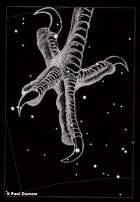 Have you ever wondered about the origins of the constellations in the night sky? Who first named them and where do they come from? Do all cultures see the sky the same way? In this six-week course on ‘ethnoastronomy’, you will learn about the stories and mythologies behind the constellations and how to identify some of them in the night sky. Moreover, this course will focus on how Aboriginal Australians; Ancient Egyptians, American Indians and others view the sky in addition to examining their cosmogonies, stories, legends and myths relating to their patterns in the sky. This is the only ethnoastronomy course in the world that uses a planetarium to teach you more about the world’s cultural astronomy.
Have you ever wondered about the origins of the constellations in the night sky? Who first named them and where do they come from? Do all cultures see the sky the same way? In this six-week course on ‘ethnoastronomy’, you will learn about the stories and mythologies behind the constellations and how to identify some of them in the night sky. Moreover, this course will focus on how Aboriginal Australians; Ancient Egyptians, American Indians and others view the sky in addition to examining their cosmogonies, stories, legends and myths relating to their patterns in the sky. This is the only ethnoastronomy course in the world that uses a planetarium to teach you more about the world’s cultural astronomy.Date Time Cost Astronomy Educator Status Future dates TBA 7.30pm to 9.30pm $210 per person Paul Curnow




